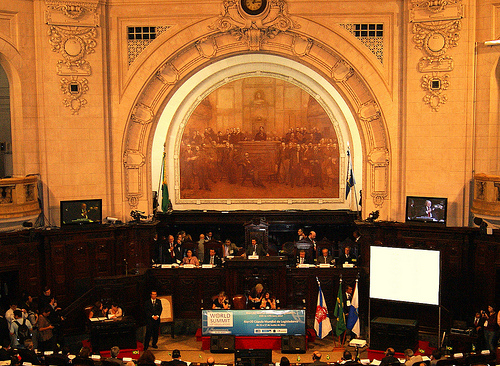By Busani Bafana
RIO DE JANEIRO, Jun 20 (TerraViva) More than 300 lawmakers have signed the Rio+20 Legislators’ Protocol to keep an eye on politicians who make promises on sustainability commitments they never keep.
The Legislators’ Protocol – the highlight of the first World Summit of Legislators held ahead of the Rio+20 conference – was signed by lawmakers from 85 countries calling for political commitment to achieve economic growth, sustainability and justice and no regression on environmental law commitments.
For African lawmakers, the protocol has set the stage for battles ahead to get home governments to account for environmental commitments, support best legislative practices and integrate natural capital in national accounts.
“We have a lot of organisations putting efforts on conservation but there has been a gap because most of these efforts have not seen political legitimacy which is through pieces of legislation to support them,” said Stephen Kampyongo, a legislator and member of the Zambian Parliamentary Conservation Caucus.
“We have to reinforce our role and hold our executive government accountable for commitments they make and scrutinising the commitments of our government and ensure they are implemented.”
Co-Chair of the Zambian parliamentary caucus, Mwanda Imenda, said deforestation was a problem that needed urgent address in her country. Lawmakers have to lobby for the government to act on protecting the environment.
“This will not be easy but as the summit urged, the battle has just began and we are ready,” Imenda told TerraViva.
South Africa has enacted a raft of environmental laws, making it a model for other African countries. Presenting a paper on the case of South Africa, parliamentarian Ruth Bhengu cited South Africa’s proactive National Environmental Management Act (NEMA), which was the framework law for the environment.
An amendment to this act created the environmental Management Inspectorate known as the “Green Scorpions” under which people can be charged for crimes against the environment.
“Reported convictions of environmental criminals have increased, although we remain concerned about the incidents of rhino poaching I our protected areas,” Bhengu said.
For Byarugaba Bakunda, from Uganda, the protocol would be a rallying point for government and parliamentarians to tackle nagging environmental issues of deforestation and drought in the country.
Each of the legislators who attended the summit collected a printed pledge to which they will add their names to affirm their renewed commitment to progressive environmental legislation, poverty alleviation and ensuring effective scrutiny of public policy on environmental laws.
Andre Misiekaba, a member of the National Assembly of Suriname in the Caribbean, said the signing of the Legislators’ Protocol gave the summit a unique mandate in raising awareness about sustainable development in global parliaments.
“We have made a strong statement to our governments and we must act on what have agreed on by putting in place legislation to save our world,” said Misiekaba.
Hasan Tuluy, vice president of the World Bank for Latin America and the Caribbean, described the Legislators’ Protocol as a milestone in enacting national laws based on the Rio agenda. He urged countries to adapt new synergies between the twin goals of economic development and environmental responsibility.








 Add to Google
Add to Google







